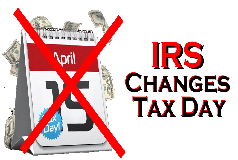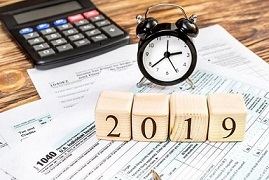Prudhomme Associates, CPAs
Blog 
***TAX FILING UPDATE***

As we comply with the State of California’s Executive Order requiring us to remain in our homes, we want to let you know that we are all working remotely and moving forward on your accounts. We have reduced our on-site office personnel to a minimum. If you call the office, our switchboard may be down, but you may leave a voicemail for anyone in the office and your call will be returned promptly. You can also reach out to us by e-mail. Please contact any of our staff at their office e-mail address. If you don’t have a direct e-mail address for one of our staff, please leave an e-mail message on our website on the “Contact” page, and we will get back to you promptly. We will respond by e-mail or telephone call from our remote locations.
• The Treasury Department has extended the April 15 tax filing deadline to July 15, 2020, which will provide relief from the disruptions of the Corona Virus Pandemic.
• We will continue to be working diligently to complete your tax returns and coordinate electronic filing with you on a continuous basis throughout the California “Stay at Home” order.
Thank you for your patience during this time. We are doing our best to be a reliable resource for all of our clients.
Stay safe everyone!
Getting Ready for 2019 Tax Filings

Now that 2019 is over, individuals and businesses will have to get ready for the upcoming tax filing deadlines. Here are a few tips to help make it easier for both you and your accountant:
1. Complete your 2019 tax organizer to make sure you don’t forget anything. It serves as a great reminder. Didn’t get an organizer? You can call or email us!
2. Make sure to keep track of your charitable donations either in cash or in-kind. It’s best to keep your donation receipts to substantiate the deductions you are claiming.
3. Contribute to your retirement plan. It’s not too late to make a contribution to your retirement plan. This is a complicated topic so, if you have any specific questions, please call or email us.
4. If you receive anything in the mail that says “Important Tax Document Enclosed”, chances are it is very important. Please don’t ignore it. It could be a government form such as a 1099, 1098 or W-2 which are needed for your tax filing.
5. If you have a business and you pay vendors (excluding corporations) for services that amount to $600 and above, you will need to issue a Form 1099 by the end of January 2020. This also includes payments to attorneys and medical providers even though they are corporations.
On another note, in December of 2019 Congress approved some tax extenders. Tax extenders are a term used to refer to expired or expiring tax provisions. These extenders tend to be short-term, some might have expired in 2017 or 2018 and now Congress is bringing them back and extending through 2019 or 2020. Here are some of the popular deductions that were part of the tax extenders in 2019:
1. Mortgage insurance premium or PMI – This deduction expired at the end of 2017. However, Congress renewed this deduction retroactively and extended this deduction through 2020.
2. Medical expense deduction floor – Medical expense deduction floor was 7.5% for 2017 and 2018. It was supposed to go up to 10% in 2019 but now Congress extended the 7.5% floor through 2020. This means that you can deduct medical expenses that are over 7.5% of your adjusted gross income.
3. Qualified tuition and related expenses deduction – This deduction expired at the end of 2017. However, Congress amended the provision to extend it through December 31, 2020. This deduction allows taxpayers to claim an above-the-line deduction for qualifying education expenses without having to itemize.
4. Exclusion of COD (Cancellation of Debt) for primary residence mortgage debt – This provision was renewed retroactively for 2018 through 2020s. Taxpayers are allowed to exclude from their gross income any COD from qualified principal residence indebtedness.
Unfortunately, Congress did not reinstate the unreimbursed employee expenses that used to be deductible under Schedule A. In addition, the caps on state and local taxes (SALT) remained unchanged.
If you have any questions or need help getting ready for your 2019 taxes, we are here to help. We are all excited and geared up to make sure you all get the most deductions and tax benefits you deserve.
IRS Scam Calls and Letters

Earlier this year I received a voicemail message from my Mom. She was in a full-blown panic and she desperately needed my help. She told me the IRS had just called her and told her they had assessed thousands of dollars in penalties and that they needed payment right away. Lucky for her, amid her panic, she hung up and called me instead.
She is not alone. Many Americans receive calls like this each year and this type of scam tactic is becoming more popular. These scams run year-round. Scammers continue to pose as IRS agents and attempt to scare individuals into sending them money. Scare tactics range from reading out fake badge numbers to threatening to call the authorities. Many times these scammers are successful.
Getting a hold of an IRS agent is not easy. Even as a tax professional, one must navigate through long and tedious menus over the phone and often wait on hold for long periods of time. The IRS will never call or email an individual to demand money. In the case that you do have a tax liability, they will issue you a notice via mail. This notice will give you the appropriate call back numbers and addresses to respond to and resolve the issue (if needed). Furthermore, the IRS will never:
1. Call or email you to demand immediate payment, especially by asking for credit card or debit card numbers over the phone.
2. Demand payment by pre-paid debit cards, or gift cards.
3. Demand that you pay taxes right away and not allow you to discuss or appeal the amount you supposedly owe.
4. Ask that you verify your personal information such as your social security number, name, and address.
Unfortunately, scammers have started to also send fake letters and bogus emails with the IRS logo to individuals. If you are unsure about a letter and/or email, we encourage you to call the hotlines listed on their website, or contact your CPA for assistance.
IRS hotline numbers can be found here: https://www.irs.gov/e-file-providers/contact-irs-for-more-information
For a list of Tax Scams/Consumer Alerts: https://www.irs.gov/newsroom/tax-scams-consumer-alerts
How to Start Building an Emergency Fund

Emergency funds are necessary. We all need to be prepared for those unplanned expenses that show up when we least expect them. Home repairs, illness, job loss —there are so many things that can happen at any moment. Are you prepared to handle them? An emergency fund will prepare you for those unexpected setbacks and reduce your dependence on borrowing money, most likely at high interest rates. It’s not a question of whether or not we need an emergency fund, but how much of an emergency fund we really need.
According to www.thebalance.com’s article written by Erin Huffstetler, the following information will help with taking steps to build your emergency fund.
Decide How Much You'd Like to Save
$1,000, three to six months' living expenses, a year's wages—there are a lot of opinions out there about how much money you should put into an emergency fund, but the only opinion that matters is yours. Ask yourself how much you would need to have tucked away to feel secure, and make that the amount that you save in your emergency fund.
Calculate Your Monthly Expenses
Make a list of all of your regular monthly expenses—housing costs, food, utilities, debt repayments, transportation costs, insurance, and all of your other "must-pay" bills. If you need to cover $2,500 in monthly expenses for three months, you'll need to set aside $7,500 in your emergency fund.
Here’s an emergency fund calculator that may help you determine how much you should save for a rainy day.
https://www.nerdwallet.com/blog/banking/emergency-fund-calculator/
Open an Account
Once you've determined how much you need to save, it's time to decide where you'll keep your money. Since you want your emergency fund to remain fairly accessible, a savings account, money market account, or short term certificates of deposit —make good sense. Any one of these accounts will give you the liquidity that you need, while still earning you some interest.
Determine How Much You Can Afford to Save
If you're like most people, it's going to take time to build up your emergency fun—probably even a lot of time. That's okay. The important thing is that you get started today. Look over your finances and determine how much you can afford to put toward your emergency fund each month. Even $10 a month will help, so don't worry if that's all you can afford to do.
Set up Automatic Deposits
Make saving easy by scheduling automatic deposits to your emergency fund. Then, sit back and watch as the balance grows month-after-month.
The bottom line, according to www.fidelity.com is that there are many other circumstances besides losing a job that could require having cash on hand—like natural disasters, unexpected child care expenses, or a surprise medical bill that insurance won't cover.
You may not be able to plan for all of them but protecting yourself with insurance, having ample cash savings that are easily accessed, and keeping credit available, just in case, make a good start.
That’s one reason that Fidelity suggests establishing an emergency fund and then continuing to save 5% of your after-tax income for unexpected expenses.
Read Viewpoints on Fidelity.com: 50/15/5: a saving and spending rule of thumb.
Everyone needs an emergency fund—no matter how old you are or what your income level is. And if you’re diligent about saving for it, you'll be ready for anything—rain or shine.
